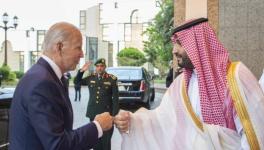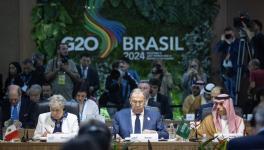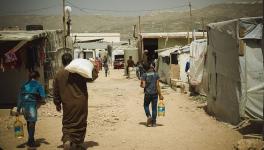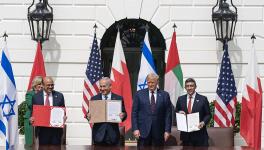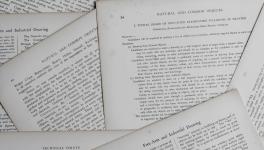Once Upon a Time, Kuwait was a Key Partner for India
The Kuwaiti oil fields set on fire by the retreating Iraqi occupation forces during the First Gulf War, 1991 (File photo)
The political transition in Kuwait with the departure of Emir Sheikh Sabah al-Sabah is a timely reminder that the Gulf Cooperation Council region is a complex mosaic not only in geography, but in politics and religion as well, although the world opinion is accustomed to regard it through the prism of two regional states, Saudi Arabia and the UAE.
Kuwait is particularly distinctive for its religious tolerance — roughly 35 percent of the Muslim population are of Shia faith — and its unique brand of pluralism and consensual politics — Kuwait has an elected parliament as a deliberative forum — which makes it something of an outlier in a conflict-stricken region.
Therefore, it is not difficult to understand why Iran’s Foreign Minister Javad Zarif travelled to Kuwait to personally hand over a message to the new emir Nawaf Al-Ahmad Al-Jaber Al-Sabah from President Hassan Rouhani expressing the hope that the two countries could look forward to further expansion of friendly bilateral relations and seek the development of stability and security in the region.
The Shia-Sunni divide that used to be the axis of violence in the Middle East for most of the recent decades went right through Kuwait. Yet, the roughly 35 percent who are Shia in that majority-Sunni nation openly practice their faith and don’t hide their religious affiliation, something that is inconceivable in most of the other Gulf states (with the solitary exception of Oman, perhaps.) Kuwait, incidentally, has enacted a national unity law that explicitly prohibits “stirring sectarian strife.”
One way of explaining such humanistic traits is that religious strife is bad for commerce, and Kuwait thrives on “business”. The Kuwaitis are the nearest to the Marwaris of Rajasthan in their enterprise and resilience and their fine grasp of credit and trading network. The ruling Al Sabah family has had a relationship with Kuwaiti Shia merchant families that goes back several centuries — and when we speak of Kuwaiti Shia families, we are often talking about Iranian families who still can converse in Persian after domicile in Kuwait for generations.
Kuwait is the complete antithesis of Saudi Arabia, where Shias, who make up 10 to 15 percent of the population, are targeted by the state, and the impact of intolerance compels them to live in hiding under the Wahhabi monarchy.
The late Kuwaiti emir was extremely wary of Saudi policies that might push his tiny city state and other Gulf states into wars they didn’t want. He marked a careful distance from the intra-Arab squabbles and disputes, the most notable instances in the recent times being the Saudi-Emirati conspiracy to overthrow the regime in Qatar, the bloody conflict in Syria to overthrow the Assad government and the horrific Saudi-Emirati expansionist policies in Yemen and Libya.
Without doubt, the late emir’s independent regional policies translated as friendly relations between Kuwait and Iran in a regional milieu where the US-led regional strategy was riveted on the containment of Iran. Tehran appreciated this in full measure and indeed reciprocated. The strong likelihood is that the the new Emir, Nawaf Al-Ahmad will follow his predecessor’s wise policies.
This is partly due to necessity but partly also stemming from the dynamic role that the Kuwaiti parliament wields in rationalising Kuwait’s politics and directing the country’s political forces. The point is, although Kuwait does not conform to Westminster-style parliamentary democracy, the country enjoys an appreciable degree of freedom, pluralism and democratic choices.
Kuwait’s constitution calls for elections to be held for the National Assembly (parliament) once in four years (if not earlier if the constitutional court or the emir chooses to dissolve the elected body.) The system provides for universal adult suffrage and allows political groups and parliamentary voting blocs, although the law does not recognise political parties as such.
In the last election in 2016, Salafist and the Muslim Brotherhood candidates posing as independents won a total of 24 seats (out of 50), and, curiously, one female candidate was elected too! Clearly, Kuwait’s internal situation, which provides for certain media freedom and public opinion, virtually rules out the possibility of the country joining the UAE’s path of normalisation with Israel.
All this brings us to the strange priorities of the Modi government in choosing its friends and partners in the GCC region. The Modi government has handpicked three of the most reactionary and repressive regimes in the Gulf region as its preferred partners — Saudi Arabia, UAE and Bahrain.
PM Modi has visited all these three countries (UAE more than once, inexplicably) but has left out Kuwait and Oman, the two Gulf countries that are closest to India in their political, cultural and civilisational ethos. In their political tolerance and pluralism, Kuwait and Oman are beacon lights for a New Middle East some day.
This aberration in Modi government’s Gulf policies is incomprehensible. It is illogical. Delhi should have deputed a special envoy to Kuwait to convey our sympathy over the departure of the emir who is often described as the “prince of diplomacy and humanity”.
The foreign leaders who travelled to Kuwait in recent days included King Abdullah of Jordan, Oman’s Sultan Haitham, Bahrain’s Crown Prince Salman bin Hamad Al Khalifa, Egyptian President Abdel Fattah El Sisi and Iraq’s President Barham Salih.
Curiously, Britain’s Prince Charles visited Kuwait on Sunday to extend condolences; so indeed US Secretary of Defence, Mark Esper representing the Trump administration.
When I was deputed post-haste to Kuwait as Charge’Affaires a.i. to reopen the embassy just a week after the 1991 Gulf War ended (on the basis of an assurance given to the parliament by then EAM IK Gujral). Over half of Kuwait’s expatriate population used to comprise of Indian nationals totalling a quarter million.
Kuwait was such a priority relationship for India that then Commerce Minister in the Chandrasekhar government Subramanian Swamy came as special envoy to the war-torn, ravaged country under curfew — with the great oil fields set on fire by the fleeing Iraqi occupation troops — simply to greet the Kuwaiti leadership returning from exile after the First Gulf War ended in 1991. Those were halcyon days in India-Kuwait relations.
The recent reports mention that when the pandemic arrived, 14.5 lakh Indians were living in Kuwait (total population: 43 lakhs), which was half of the entire expatriate population. The figures still speak for themselves.
It shouldn’t take more time to travel to Kuwait from New Delhi than it takes to visit Thiruvananthapuram. It is not too late for Modi government to make amends. Paying respects to a bereaved family is an ancient Indian custom.
Courtesy: Indian Punchline
Get the latest reports & analysis with people's perspective on Protests, movements & deep analytical videos, discussions of the current affairs in your Telegram app. Subscribe to NewsClick's Telegram channel & get Real-Time updates on stories, as they get published on our website.











